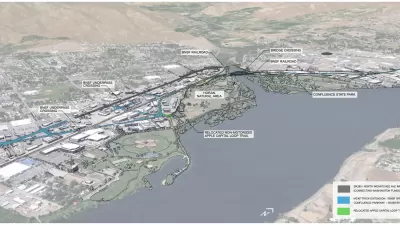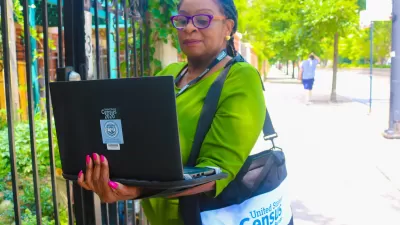At Census time, America's prisoners have typically been counted as residents of the places they are imprisoned. But with nearly 1% of the U.S. population behind bars, where they're counted is counting more to the urban areas they came from.
"Counting prisoners where they're incarcerated didn't matter a lot when America had modest numbers of inmates, usually held in institutions near their homes.
But all that's changed in the last three decades as America's prisoner counts have soared from about 500,000 in 1980 to 2.3 million today. The combination of tough 'law-and-order' politics and development of a vast 'prison industrial complex' has led to confinement of predominantly city-based convicts in hundreds of new prisons in small town areas."
Now some counties with prisoner populations of up to 20% are gaining more congressional representation and federal funding. Neal Pierce takes a look at the problem and how some officials are trying to find a solution.
FULL STORY: How the Census Counts Prisoners: Significant Political Stakes

Planetizen Federal Action Tracker
A weekly monitor of how Trump’s orders and actions are impacting planners and planning in America.

Restaurant Patios Were a Pandemic Win — Why Were They so Hard to Keep?
Social distancing requirements and changes in travel patterns prompted cities to pilot new uses for street and sidewalk space. Then it got complicated.

Maui's Vacation Rental Debate Turns Ugly
Verbal attacks, misinformation campaigns and fistfights plague a high-stakes debate to convert thousands of vacation rentals into long-term housing.

Boulder Eliminates Parking Minimums Citywide
Officials estimate the cost of building a single underground parking space at up to $100,000.

Orange County, Florida Adopts Largest US “Sprawl Repair” Code
The ‘Orange Code’ seeks to rectify decades of sprawl-inducing, car-oriented development.

Maui's Vacation Rental Debate Turns Ugly
Verbal attacks, misinformation campaigns and fistfights plague a high-stakes debate to convert thousands of vacation rentals into long-term housing.
Urban Design for Planners 1: Software Tools
This six-course series explores essential urban design concepts using open source software and equips planners with the tools they need to participate fully in the urban design process.
Planning for Universal Design
Learn the tools for implementing Universal Design in planning regulations.
Heyer Gruel & Associates PA
JM Goldson LLC
Custer County Colorado
City of Camden Redevelopment Agency
City of Astoria
Transportation Research & Education Center (TREC) at Portland State University
Camden Redevelopment Agency
City of Claremont
Municipality of Princeton (NJ)




























